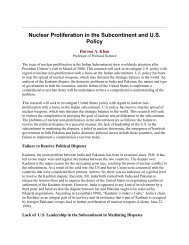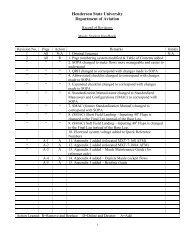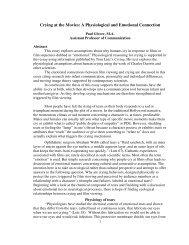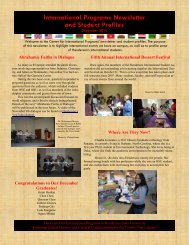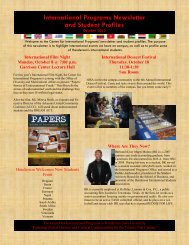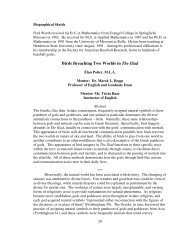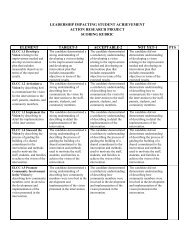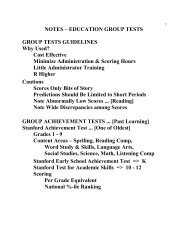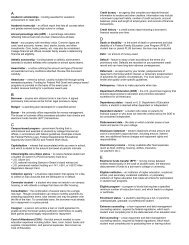Book Review: Anna in the Tropics Nilo Cruz - Henderson State ...
Book Review: Anna in the Tropics Nilo Cruz - Henderson State ...
Book Review: Anna in the Tropics Nilo Cruz - Henderson State ...
Create successful ePaper yourself
Turn your PDF publications into a flip-book with our unique Google optimized e-Paper software.
Academic Forum 21 2003-04<br />
<strong>Book</strong> <strong>Review</strong>:<br />
<strong>Anna</strong> <strong>in</strong> <strong>the</strong> <strong>Tropics</strong><br />
<strong>Nilo</strong> <strong>Cruz</strong><br />
by<br />
Henry Pérez<br />
Professor of Foreign Languages<br />
<strong>Anna</strong> <strong>in</strong> <strong>the</strong> <strong>Tropics</strong>, <strong>the</strong> latest play by <strong>the</strong> Cuban-American author <strong>Nilo</strong> <strong>Cruz</strong>, is <strong>the</strong><br />
recipient of <strong>the</strong> Pulitzer Prize for Drama. The action of this two-act play occurs <strong>in</strong> (Ybor City)<br />
Tampa, Florida, <strong>the</strong> home of several Cuban cigar factories <strong>in</strong> <strong>the</strong> United <strong>State</strong>s dur<strong>in</strong>g <strong>the</strong> end of<br />
<strong>the</strong> n<strong>in</strong>eteenth century and <strong>the</strong> beg<strong>in</strong>n<strong>in</strong>g of <strong>the</strong> twentieth. The action of <strong>Anna</strong> <strong>in</strong> <strong>the</strong> <strong>Tropics</strong><br />
takes place <strong>in</strong> 1929, a time of economic upheaval due to <strong>the</strong> market crash. Among <strong>the</strong> <strong>the</strong>mes of<br />
<strong>the</strong> play are: tradition vs. change; male perspective vs. female perspective; nature; literature;<br />
act<strong>in</strong>g; and, of course, love. The title of <strong>the</strong> play alludes to its tragic outcome: <strong>the</strong> <strong>Anna</strong> of <strong>the</strong><br />
title refers to Leo Tolstoy’s novel <strong>Anna</strong> Karen<strong>in</strong>a where <strong>the</strong> romantic triangle of <strong>the</strong> classic<br />
Russian novel and <strong>the</strong> tragic end<strong>in</strong>g of <strong>the</strong> adulterous affair reappear <strong>in</strong> <strong>Anna</strong> <strong>in</strong> <strong>the</strong> <strong>Tropics</strong>.<br />
In act one, <strong>the</strong> lone agent of change is Chester (Cheché), <strong>the</strong> half-bro<strong>the</strong>r of <strong>the</strong> cigar<br />
factory owner, who wants to do away with <strong>the</strong> position of lector (reader) <strong>in</strong> <strong>the</strong> factory and<br />
<strong>in</strong>troduce mach<strong>in</strong>ery <strong>in</strong>to <strong>the</strong> hand-rolled cigar <strong>in</strong>dustry. The rest of <strong>the</strong> characters want to keep<br />
<strong>the</strong> traditional lector, who reads aloud novels and newspapers while <strong>the</strong> cigars workers labor.<br />
Tradition, momentarily w<strong>in</strong>s, due to <strong>the</strong> fact that <strong>the</strong> lector is paid by <strong>the</strong> workers and not <strong>the</strong><br />
owner. <strong>Nilo</strong> <strong>Cruz</strong>, <strong>in</strong> an <strong>in</strong>troductory note to his play expla<strong>in</strong>s: “After 1931, <strong>the</strong> lectors were<br />
removed from <strong>the</strong> factories, and what rema<strong>in</strong>ed of <strong>the</strong> cigar rollers consisted of low-paid<br />
American workers who operated mach<strong>in</strong>es. The end of a tradition.” Cheché, personally, resents<br />
lectors, because his American wife ran away with <strong>the</strong> previous lector <strong>in</strong> <strong>the</strong> cigar factory.<br />
Act two shows <strong>the</strong> magic power of great literature s<strong>in</strong>ce all <strong>the</strong> characters grow after<br />
listen<strong>in</strong>g to <strong>the</strong> lector read <strong>Anna</strong> Karen<strong>in</strong>a and by discuss<strong>in</strong>g <strong>the</strong> mean<strong>in</strong>g of <strong>the</strong> book accord<strong>in</strong>g<br />
147
Academic Forum 21 2003-04<br />
to each o<strong>the</strong>r’s po<strong>in</strong>t of view. The cigar factory owner and his wife have become closer than ever<br />
and <strong>the</strong>ir younger daughter, whose humorous reactions were child-like <strong>in</strong> <strong>the</strong> first act, now<br />
behaves like an adult. Their oldest daughter and her husband have also changed; <strong>the</strong>ir troubled<br />
marriage reflects <strong>the</strong> plot of <strong>the</strong> Russian masterpiece. In <strong>the</strong> first act, <strong>the</strong> problem with <strong>the</strong> oldest<br />
daughter’s marriage is that <strong>the</strong> husband is hav<strong>in</strong>g an affair. In <strong>the</strong> second act, it is <strong>the</strong> wife who<br />
has an affair with <strong>the</strong> new lector. Curiously, <strong>the</strong> lector’s role becomes that of a sex surrogate who<br />
actually br<strong>in</strong>gs <strong>the</strong> married couple toge<strong>the</strong>r aga<strong>in</strong>. Momentarily, <strong>the</strong> tragic end<strong>in</strong>g seems altered;<br />
however, tragedy lurks <strong>in</strong> <strong>the</strong> m<strong>in</strong>d of <strong>the</strong> only character who has not changed—Cheché. It is<br />
ironic that <strong>the</strong> agent of change <strong>in</strong> <strong>the</strong> cigar <strong>in</strong>dustry has not grown like <strong>the</strong> rest of <strong>the</strong> characters<br />
<strong>in</strong> <strong>the</strong> play; perhaps <strong>the</strong> author is differentiat<strong>in</strong>g between real personal growth and overblown<br />
advances <strong>in</strong> technology. Cheché takes revenge on <strong>the</strong> lector, possibly to make up for his lack of<br />
action when <strong>the</strong> previous lector ran away with his wife.<br />
In <strong>Anna</strong> <strong>in</strong> <strong>the</strong> <strong>Tropics</strong>, <strong>Nilo</strong> <strong>Cruz</strong> has recreated a previous historical boom of Cuban<br />
workers and entrepeneurs <strong>in</strong> <strong>the</strong> United <strong>State</strong>s and has done so <strong>in</strong> a poetic style that is delightful<br />
to read or listen to on <strong>the</strong> stage. The philosophical and psychological <strong>in</strong>sights ga<strong>in</strong>ed by <strong>the</strong><br />
actors of <strong>the</strong> play can be equally <strong>in</strong>structive for <strong>the</strong> reader or spectator. And if this is not enough,<br />
reader and spectator of <strong>Anna</strong> <strong>in</strong> <strong>the</strong> <strong>Tropics</strong> look forward to dust<strong>in</strong>g off <strong>the</strong>ir copy of Toltoy’s<br />
<strong>Anna</strong> Karen<strong>in</strong>a from <strong>the</strong>ir bookshelf.<br />
148
Academic Forum 21 2003-04<br />
<strong>Book</strong> <strong>Review</strong>:<br />
ReMember<strong>in</strong>g Cuba: Legacy of a Diaspora<br />
Andrea O’Reilly Herrera, Editor<br />
by<br />
Henry Pérez, Ph.D.<br />
Professor of Foreign Languages<br />
If you are part of <strong>the</strong> Cuban exodus, like me, this heartfelt book can be very pa<strong>in</strong>ful to<br />
read. It rem<strong>in</strong>ds you of what you went through <strong>in</strong> order to flee Castro’s Cuba and <strong>the</strong> difficulties<br />
of start<strong>in</strong>g a new life away from your home country, away from your own language and culture.<br />
However, as <strong>the</strong> say<strong>in</strong>g goes “no pa<strong>in</strong>, no ga<strong>in</strong>.” Professor O’Reilly Herrera must be<br />
congratulated for compil<strong>in</strong>g <strong>the</strong> testimonies found <strong>in</strong> this text. ReMember<strong>in</strong>g Cuba consists of<br />
testimonials from Cuban exiles who left <strong>the</strong>ir country at different times dur<strong>in</strong>g <strong>the</strong> last forty-five<br />
years, people from different generations, and from different social and economic backgrounds. It<br />
also <strong>in</strong>cludes literary and artistic samples from several writers, pa<strong>in</strong>ters, and photographers.<br />
Professor O’Reilly Herrera dedicates this book to Heberto Padilla, <strong>the</strong> recently deceased<br />
Cuban poet and “all of those who have died, <strong>in</strong> exile, with <strong>the</strong> unfulfilled hope of return<strong>in</strong>g to a<br />
free Cuba. In <strong>the</strong> “Preface,” she expla<strong>in</strong>s how this project really started when she was<br />
approximately seven years old when she would beg her older Cuban relatives to tell <strong>the</strong>ir stories<br />
about leav<strong>in</strong>g Cuba. Her quote from Edward Said describes <strong>the</strong> pa<strong>in</strong>ful experience of exile<br />
perfectly: “For exile is fundamentally a discont<strong>in</strong>uous state of be<strong>in</strong>g. Exiles are cut off from <strong>the</strong>ir<br />
roots, <strong>the</strong>ir land, <strong>the</strong>ir past.” In <strong>the</strong> “Introduction,” O’Reilly Herrera discusses <strong>the</strong> differences and<br />
similarities between exiles who left Cuba as children and those who left as adults. Cuban writers<br />
Ricardo Pau-Llosa and Re<strong>in</strong>aldo Arenas expla<strong>in</strong> <strong>the</strong> suffer<strong>in</strong>g that accompany abandon<strong>in</strong>g one’s<br />
country—thus ma<strong>in</strong>ta<strong>in</strong><strong>in</strong>g <strong>the</strong> sorrowful tone of <strong>the</strong> book: “The exile knows his place, and that<br />
place is <strong>the</strong> imag<strong>in</strong>ation….” And “The exile is a person who, hav<strong>in</strong>g lost a loved one, keeps<br />
search<strong>in</strong>g for <strong>the</strong> face he loves <strong>in</strong> every new face and, forever deceiv<strong>in</strong>g himself, th<strong>in</strong>ks he has<br />
149
Academic Forum 21 2003-04<br />
found it.”<br />
Section I, “The Interior Exile,” <strong>in</strong>cludes several testimonials that emphasize <strong>the</strong> fact that<br />
many, who are still <strong>in</strong> Cuba, are already <strong>in</strong> exile with<strong>in</strong> <strong>the</strong> island s<strong>in</strong>ce <strong>the</strong>y oppose <strong>the</strong><br />
revolution and are treated as outsiders. This part of <strong>the</strong> book deals with <strong>the</strong> recollection of life <strong>in</strong><br />
Cuba before escap<strong>in</strong>g.<br />
Section II, “Merely a Player,” narrates <strong>the</strong> experience of several people who left Cuba as<br />
children, several of whom were members of Operation Peter Pan (14,000 unescorted children left<br />
Cuba dur<strong>in</strong>g <strong>the</strong> 1960’s with <strong>the</strong> help of <strong>the</strong> United <strong>State</strong>s government and <strong>the</strong> Catholic Church.<br />
Once <strong>in</strong> <strong>the</strong> United <strong>State</strong>s <strong>the</strong>se children were placed with relatives, foster parents, or <strong>in</strong><br />
orphanages.) Memories from this group are not only about Cuba, but also about <strong>the</strong> United<br />
<strong>State</strong>s. Comparisons and contrasts between both nations abound <strong>in</strong> this section as <strong>the</strong>se young<br />
exiles try to understand <strong>the</strong>ir double identity as Cuban-Americans.<br />
Section III, “Cross<strong>in</strong>g <strong>the</strong> Generational Divide,” exile is seen from <strong>the</strong> perspective of<br />
members of <strong>the</strong> same family, but from different ages. The struggle of <strong>the</strong> adults to f<strong>in</strong>d ga<strong>in</strong>ful<br />
employment is explored along with <strong>the</strong> equally difficult attempt of <strong>the</strong>ir children as <strong>the</strong>y try to fit<br />
<strong>in</strong> school. Both generations struggle to succeed <strong>in</strong> <strong>the</strong> new culture without abandon<strong>in</strong>g <strong>the</strong> ways<br />
of <strong>the</strong> country to which <strong>the</strong>y hoped to return some day.<br />
Section IV, “Snapshots,” <strong>the</strong> common thread <strong>in</strong> this part of <strong>the</strong> book is <strong>the</strong> family<br />
connections. The majority of <strong>the</strong> recollections perta<strong>in</strong> to <strong>the</strong> relationship between <strong>the</strong> older<br />
generation of Cubans who arrived <strong>in</strong> <strong>the</strong> United <strong>State</strong>s as adults and <strong>the</strong>ir children who have been<br />
raised <strong>in</strong> <strong>the</strong> United <strong>State</strong>s. Similarities and differences proliferate between <strong>the</strong>se two groups;<br />
however, <strong>the</strong> tie that b<strong>in</strong>ds <strong>the</strong>m is one of love.<br />
Section V, “The Culture Wars,” emphasizes <strong>the</strong> l<strong>in</strong>guistic war <strong>in</strong>side each of <strong>the</strong> bil<strong>in</strong>gual<br />
150
Academic Forum 21 2003-04<br />
and bicultural Cuban-American writers and professors ga<strong>the</strong>red <strong>in</strong> this part of <strong>the</strong> book. The<br />
“wars” be<strong>in</strong>g described, whe<strong>the</strong>r l<strong>in</strong>guistically or culturally, are <strong>in</strong> constant state of flux, no<br />
w<strong>in</strong>ners or losers here, just a cont<strong>in</strong>uous struggle with two realities equally true and mean<strong>in</strong>gful<br />
that produce a third reality, no longer just Cuban or just American, but <strong>in</strong>stead a Cuban-<br />
American reality.<br />
“The bite of Exile,” as <strong>the</strong> title implies, <strong>in</strong> section VI, deals with <strong>the</strong> pa<strong>in</strong> <strong>in</strong>volved with<br />
leav<strong>in</strong>g one’s country, The pa<strong>in</strong> is not only physical—it is also psychological. Scars have<br />
replaced <strong>the</strong> bleed<strong>in</strong>g wounds, but <strong>the</strong> pa<strong>in</strong> still l<strong>in</strong>gers. Perhaps <strong>the</strong> pa<strong>in</strong> is no longer physical,<br />
but it still hurts. This part of <strong>the</strong> book conta<strong>in</strong>s several recollections from <strong>the</strong> perspective of<br />
people at <strong>the</strong> end of <strong>the</strong>ir livers where <strong>the</strong> emphasis is on <strong>the</strong> loss caused by exile. A few,<br />
however, are younger and only <strong>in</strong> midlife; never<strong>the</strong>less, <strong>the</strong>ir memories are dark and brood<strong>in</strong>g.<br />
Section VII of Remember<strong>in</strong>g Cuba is “Grace under Pressure” and it br<strong>in</strong>gs relief from <strong>the</strong><br />
forebod<strong>in</strong>g tone of <strong>the</strong> previous chapter. Several artists, musicians, and <strong>in</strong>tellectuals expla<strong>in</strong> how<br />
exile has given <strong>the</strong>m a fertile subject to work on. The suffer<strong>in</strong>g of leav<strong>in</strong>g Cuba and start<strong>in</strong>g life<br />
from scratch has been positive <strong>in</strong> <strong>the</strong> sense of it be<strong>in</strong>g a never end<strong>in</strong>g <strong>the</strong>me for <strong>the</strong>ir art.<br />
The end<strong>in</strong>g chapter of this tome “Inherit<strong>in</strong>g Exile” summarizes <strong>the</strong> feel<strong>in</strong>gs of a new<br />
generation of Cuban-Americans. Most of <strong>the</strong>m were born outside of Cuba, of Cuban parents;<br />
however through family recollection of <strong>the</strong> island, <strong>the</strong>y are still connected to Cuba. This last<br />
section makes it clear that <strong>the</strong> book has not come to an end, that <strong>in</strong> <strong>the</strong> future, a second volume<br />
will be needed to deal with what will happen next, what will happen to Cubans <strong>in</strong> <strong>the</strong> United<br />
<strong>State</strong>s after Castro.<br />
This excellent book by Professor O’Reilly Herrera lends itself to be read and reread <strong>in</strong><br />
order to understand <strong>the</strong> Cuban Diaspora and how many preconceived ideas about Cubans <strong>in</strong> <strong>the</strong><br />
151
Academic Forum 21 2003-04<br />
United <strong>State</strong>s are just pla<strong>in</strong> stereotypes. There is no one story, <strong>the</strong>re are as many stories as <strong>the</strong>re<br />
are Cuban exiles <strong>in</strong> this country.<br />
Biography<br />
Henry Pérez, a native of Cuba, graduated from <strong>the</strong> University of Massachusetts at Boston with a<br />
double major <strong>in</strong> English and Spanish. He received his doctorate <strong>in</strong> Spanish and Lat<strong>in</strong> American<br />
Literature from <strong>the</strong> University of Massachusetts at Amherst. Dr. Pérez is <strong>the</strong> former chair of <strong>the</strong><br />
Department of Modern Languages at Manchester College <strong>in</strong> Indiana. He has taught at <strong>Henderson</strong><br />
s<strong>in</strong>ce 1991.<br />
152




